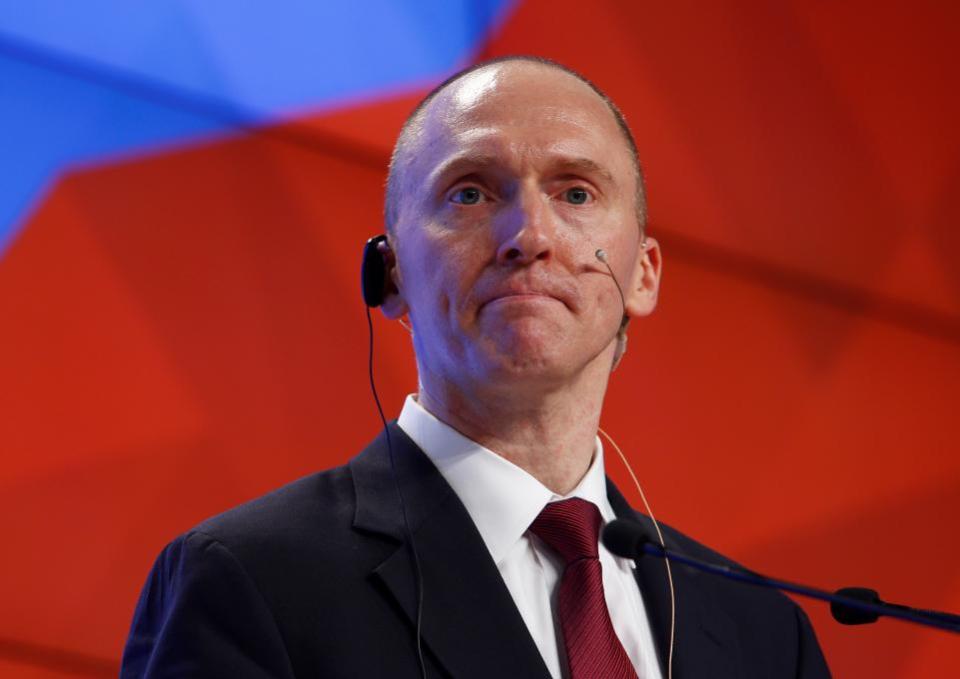Why Carter Page Wants to Talk About Facebook
A week after Carter Page reportedly told the Senate Intelligence Committee he would not appear before it as part of the Trump-Russia probe, the committee has subpoenaed him for documents and testimony, according to NBC News.
The former Trump foreign policy adviser originally offered to testify as part of the panel’s hearing on social media and its role in Moscow’s interference in the 2016 presidential election. That hearing will take place on November 1 and will feature representatives from Alphabet, FaceBook, Google and Twitter. All will testify about whether Russian entities purchased ads through them, and how Moscow was apparently able to target key demographics in battleground states.
Page, who spent most of his career working in finance and energy, doesn’t appear to have any experience in social media, technology or political advertising. But the former Trump adviser says he wants to speak about “the severe fake news that private and U.S. state-funded media organizations defamed me with in the months prior to the election...” he told Newsweek via text. (Page is suing Yahoo News and the Huffington Post for $75,000 in damages for their coverage of him).
Related: Is Trump losing the intelligence battle with Russia?

The Senate committee appears to have rejected Page's offer. Instead, it’s interested only in his alleged ties to Moscow. Those ties originate in part from a document compiled by former MI6 intelligence officer, Christopher Steele, which contains unverified allegations of misconduct and collusion between Donald Trump’s campaign and Russia. Among them: that Page had discussions with Igor Sechin, the CEO of Russia’s state oil behemoth, about lifting U.S. sanctions in exchange for a stake in the company (Page has denied these allegations). Not long after those allegations became public in January, the Trump campaign said that “Carter Page is an individual the president-elect does not know.”
Whether or not that’s true remains unclear, but the FBI is familiar with Page. In April, the former Trump adviser confirmed to ABC News that he was the individual identified as "Male-1" in a 2015 court document submitted in a case involving Russian spies. The case stems from an FBI investigation of three Russians identified as working for Moscow’s foreign intelligence agency, the SVR. One of them, Evgeny Buryakov, an executive at Vnesheconombank Bank, which has been under U.S. and European sanctions since 2014, pled guilty to espionage-related charges. He was subsequently sentenced to 30 months in prison, released in March 2017 and deported back to Russia. According to ABC News, the FBI court filings identified "the attempted use of Male-1 as an intelligence source for Russia," and that Page was told that the Russians would try "push contracts" his way. The FBI interviewed him in connection with the case, and he was never convicted of a crime.
The Senate committee and Special Counsel Robert Mueller, who is conducting his own Trump-Russia probe, are interested in any ties between Page and Vnesheconombank Bank. They’re already investigating connections between other current and former White House officials and the Russian financial firm. Both former national security adviser, Michael Flynn, and Jared Kushner, Trump’s son-in-law and current senior adviser, attended a December 2016 meeting with then Russian Ambassador Sergey Kislyak and Sergey Gorkov, the bank’s CEO (and a graduate of Russia’s FSB academy). The meeting was purportedly to set-up so-called “back channel” communications with Moscow. But the details and the purpose of that back channel remain unclear.
The committee reportedly expects Page will invoke the 5th amendment and refuse to answer any questions related to the Steele dossier.
Naveed Jamali is the author of How to Catch a Russian Spy, a memoir about working undercover as a double agent for the FBI. He continues to serve as an intelligence officer in the United States Navy Reserve and is a senior fellow in the Program on National Security at the Foreign Policy Research Institute.
Related Articles


